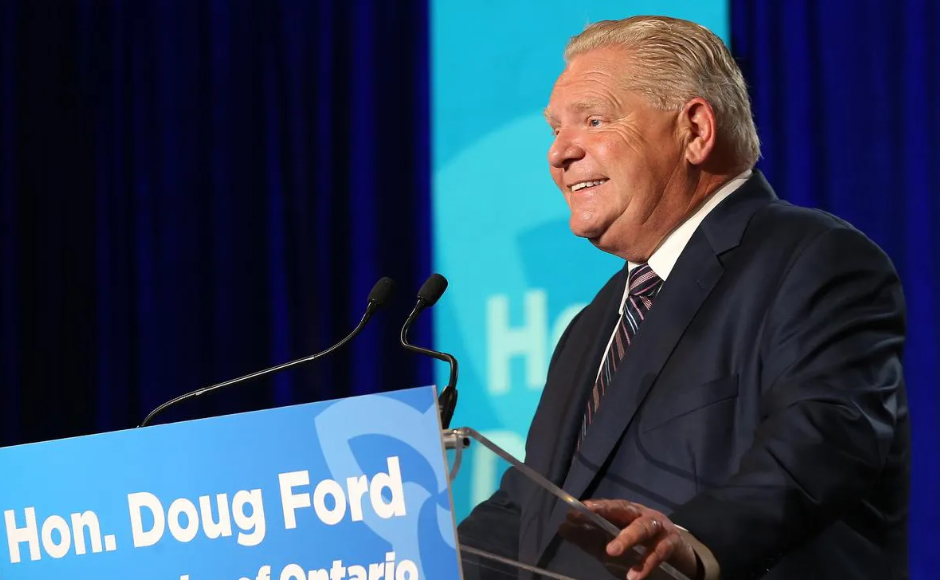Ontario’s election produced a result that is unfair and unrepresentative. The voting system needs to be changed

Re-elected Premier Doug Ford addresses media after his election victory on June 2. R.J. JOHNSTON / TORONTO STAR
From the Toronto Star, June 9, 2022
By Star Editorial Board
In Ontario’s political world, at least on the progressive side, it’s the season of tears and “pie in the sky.”
That last phrase comes from Greg Sorbara, a former Ontario Liberal finance minister and veteran party insider, who in the wake of last week’s election outcome floated the idea of merging the Liberals with the NDP.
This, as Sorbara himself acknowledged, lives in the dreamy realm of fantasy desserts. It’s a total non-starter for both parties, and beyond that it’s simply not a good idea. The Liberals and NDP aren’t just different flavours of ice cream; they have real, substantive differences and voters deserve a choice.
But Sorbara at least recognized that this election result should force conversations beyond the same-old — like who the opposition parties can find to lead them out of the wilderness.
It should, among other things, make anyone who cares about the health of democracy recognize that our current electoral system is not fit for purpose.
We know the result: only 43 per cent of eligible voters bothered to cast a ballot. Doug Ford’s Progressive Conservatives won 40.8 per cent of those votes, or just 18 per cent of the total pool of possible voters. With that, the system rewarded them with a smashing majority of 83 seats.
The Liberals came second, with 23.8 per cent of the vote, but just eight seats. The NDP was a touch behind, with 23.7 per cent, but got 31 seats because of how their votes were distributed.
The bottom line is that the PCs needed 23,043 votes to win a seat. But the Liberals needed 139,631 votes for every seat they won. The Greens were shafted most of all: their 279,174 votes resulted in exactly one seat.
This, of course, is the way our so-called First Past the Post (FPTP) system works. It rewards some big-time and leaves others in the dust. And this time it produced a result that is patently unfair, completely unrepresentative, and is bound to increase even further the widespread cynicism about electoral politics that leads to such a dismal turnout. Why bother to vote, many will conclude, when the system is so rigged?
It’s time to put electoral reform — specifically proportional representation — back on the agenda. Ontario Liberals, as they figure out how to get their party out of the ditch it landed in last week, should embrace that idea and stick with it. The NDP and Greens already support PR.
At this point in the argument, those who follow politics tend to roll their eyes and dismiss the whole idea of electoral reform as another pie-in-the-sky notion whose time has gone even before it arrived. Ontario held a referendum on the issue back in 2007, they will point out, and voters turned thumbs down. Voters in other provinces have done the same.
The Star, in the past, has been skeptical of ditching FPTP. In 2007, our predecessors in this space warned that countries with proportional representation “have become notorious for chaotic, horse-trading minority governments and legislative gridlock.”
But that was 15 years and five elections ago, and those dire words miss the point. Plenty of countries use some kind of PR without descending into chaos (the Netflix series “Borgen,” to name just one easily accessible example, shows how the sensible Danes successfully navigate their version.)
The idea that we must cling to FPTP because it results in stable majorities also misses the point. Stability has its advantages, but a majority government that rests on the votes of 18 per cent of the electorate is the stability of the grave.
Changing the system, however, is still a long shot for at least two reasons.
One is that the advocates of electoral reform can be their own worst enemies. Discussions about how to change FPTP tend to be dominated by political hobbyists and quickly descend into arcane debates on alternate systems that leave voters bored and bewildered. No wonder they cling to the familiar option.
And second, politicians who embrace electoral reform at a convenient moment (like when their party is on the ropes) too often fail to carry through when the pendulum swings and it isn’t in their immediate interest any more.
We saw that with the Trudeau Liberals, who promised to ditch FPTP on the federal level in 2015 only to abandon their pledge when it no longer suited their purpose. In Quebec, Premier François Legault is doing something similar; he promised a referendum on PR this fall but now says that isn’t possible.
If electoral reform is to have any chance it has to be kept simple and the politicians have to show leadership. It may still be pie in the sky, but it’s the right thing to do.
Read the article here









Leave a Reply